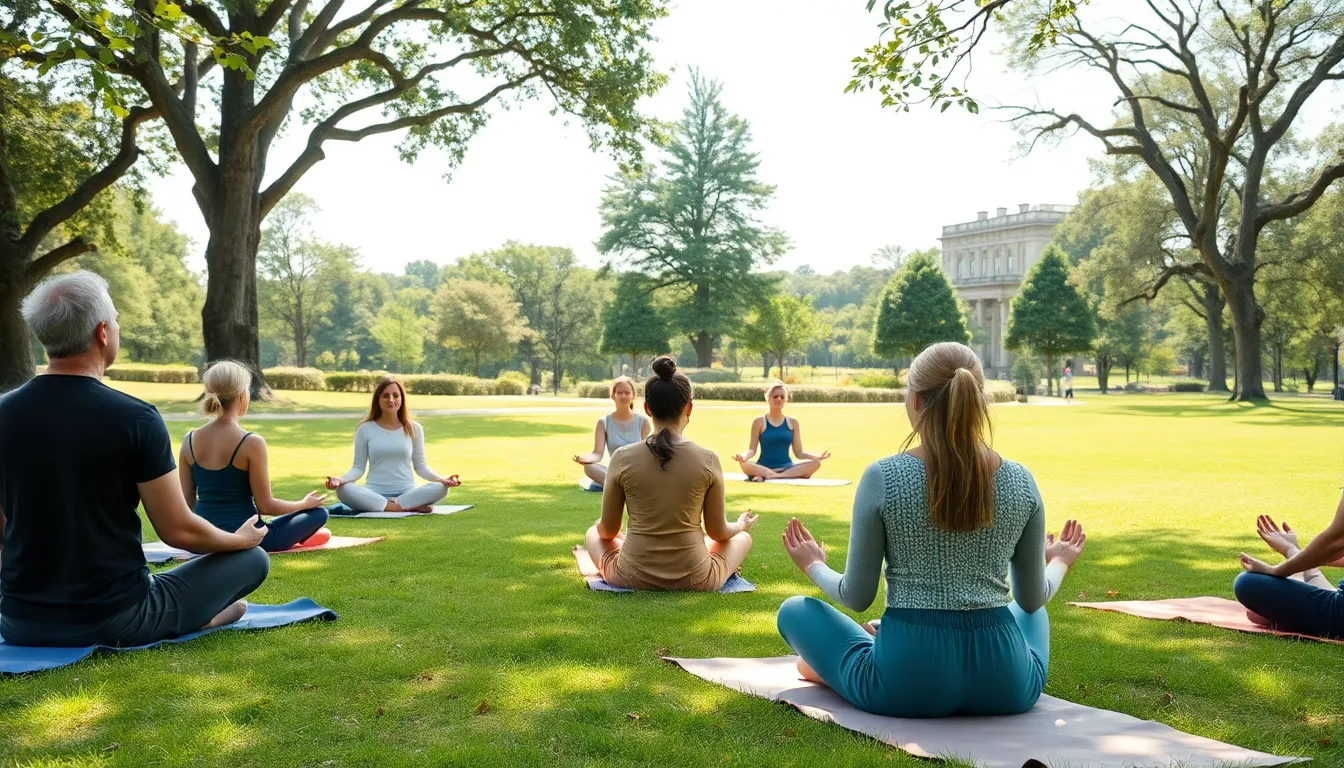Table of Contents
ToggleIn today’s fast-paced world, stress seems to be the unwelcome guest that just won’t leave. It creeps in during rush hour, lingers during deadlines, and even crashes the party at family gatherings. But what if managing stress could be as easy as finding the perfect meme to express your frustration? Spoiler alert: it can be!
Stress management isn’t just about deep breathing and yoga poses that make you look like a pretzel. It’s about practical strategies that fit into everyday life. From laughter to mindfulness, there’s a treasure trove of techniques waiting to transform those stress-induced frowns into smiles. Let’s dive into the art of stress management and discover how to kick stress to the curb while keeping a sense of humor intact. After all, if you can’t laugh at your stress, what’s the point?
Understanding Stress Management
Stress affects everyone, making its management essential for overall well-being. Exploring its definition and importance provides insight into effective stress management strategies.
Definition of Stress
Stress refers to the body’s response to external pressures and demands. Physical, emotional, and psychological factors contribute to this response, triggering sensations that can feel overwhelming. Various stressors exist, including work-related challenges, personal relationships, and life changes. Each person’s experience with stress may differ, as individual reactions vary widely. Understanding these variations helps identify personal triggers and develop coping mechanisms.
Importance of Managing Stress
Managing stress significantly impacts health, productivity, and overall quality of life. Chronic stress can lead to serious health issues like anxiety, depression, and cardiovascular diseases. Additionally, stress management techniques boost resilience and improve emotional stability. Implementing effective strategies can enhance focus and decision-making abilities. Successful management also fosters better relationships and promotes a more positive outlook. Prioritizing stress management ultimately contributes to long-term wellness and fulfillment.
Techniques for Stress Management


Effective stress management techniques can enhance daily life. Adopting these strategies boosts resilience and emotional stability.
Mindfulness and Meditation
Practicing mindfulness increases awareness and promotes relaxation. Techniques include focused breathing, body scans, and observing thoughts without judgment. Studies show that mindfulness meditation reduces anxiety levels and enhances overall well-being. Regular engagement in these practices for just a few minutes daily can lead to significant stress reduction, making it easier to manage daily pressures.
Physical Exercise
Physical activity serves as a powerful stress reliever. Engaging in exercises like running, cycling, or swimming releases endorphins, chemicals that boost mood. Participating in at least 30 minutes of moderate exercise most days can reduce feelings of tension and frustration. Joining group classes or outdoor activities can add a social element, further enhancing stress relief through community support and engagement.
Time Management Skills
Effective time management minimizes stress by establishing clear priorities. Organizing tasks using lists or digital planners helps individuals focus on essential activities. Allocating specific time blocks for work and leisure can create balance and reduce overwhelm. Setting realistic deadlines and breaking projects into smaller, manageable steps lessens pressure and fosters a sense of achievement.
Professional Help for Stress Management
Professional help provides critical support for individuals seeking to manage stress effectively. Various therapy options exist, offering tailored approaches to meet unique needs.
Therapy Options
Cognitive-behavioral therapy (CBT) often benefits those facing stress-related challenges. It helps individuals identify and change negative thought patterns, promoting healthier coping strategies. Additionally, mindfulness-based stress reduction (MBSR) is another effective method, focusing on enhancing awareness and acceptance. Some may prefer talk therapy, allowing open discussion about stressors and emotions. Each therapy type can provide valuable tools for managing everyday stress in pragmatic ways.
Support Groups
Support groups create safe spaces for individuals experiencing similar stressors. They offer community and shared experiences, fostering connection among participants. Sharing insights within these groups can lead to increased understanding and improved coping skills. Many find strength in hearing others’ stories and realizing they’re not alone in their struggles. Local community centers or online platforms host these groups, making access easier. By engaging in a support group, individuals can cultivate resilience and empower each other in managing stress effectively.
Lifestyle Changes for Stress Management
Making lifestyle changes plays a crucial role in effectively managing stress. Two significant areas that contribute to this effort are healthy eating habits and sleep hygiene practices.
Healthy Eating Habits
Maintaining a balanced diet helps reduce the effects of stress. Nutrient-rich foods, including fruits, vegetables, whole grains, and lean proteins, provide essential vitamins and minerals that support mental health. Consuming omega-3 fatty acids found in fish like salmon can lower stress hormone levels, while antioxidants in berries combat oxidative stress. Staying hydrated by drinking plenty of water also aids cognition and mood. Regular meal patterns prevent blood sugar fluctuations, which can lead to irritability and anxiety. Recognizing the connection between diet and emotional health empowers individuals to make better food choices for stress reduction.
Sleep Hygiene Practices
Establishing good sleep hygiene can significantly impact stress levels. Prioritizing consistent sleep schedules promotes better sleep quality and helps regulate the body’s internal clock. Creating a relaxing bedtime routine, such as reading or listening to calming music, signals the brain to wind down. Limiting screen time before bed reduces exposure to blue light that disrupts sleep patterns. Additionally, maintaining a comfortable sleep environment, including a cool, dark, and quiet room, enhances relaxation. Striving for 7 to 9 hours of sleep each night is crucial for overall well-being and resilience against stressors. Prioritizing sleep not only boosts mood but also improves cognitive function, leading to healthier coping mechanisms.
Managing stress is essential for maintaining overall well-being and enhancing quality of life. By integrating practical strategies into daily routines individuals can effectively combat stress and improve their emotional resilience. Emphasizing humor mindfulness and healthy lifestyle choices fosters a more balanced approach to stress management.
Seeking professional help when needed further empowers individuals to navigate their unique challenges. As they prioritize these techniques they not only reduce stress but also cultivate a more fulfilling and joyful life. Embracing these methods can lead to lasting benefits that ripple through every aspect of life.




